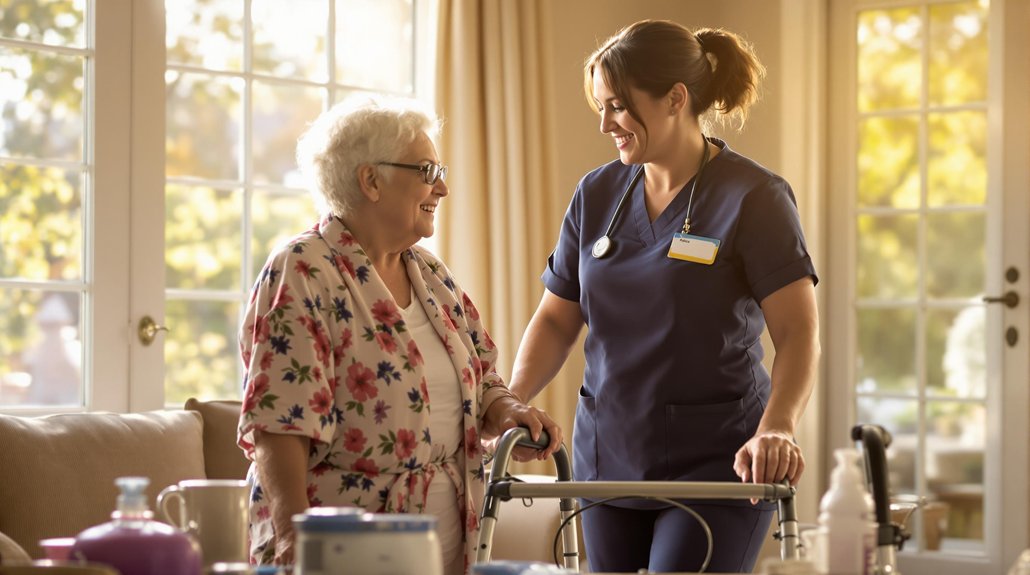Yes, you can hire professional caregivers to help you recover after surgery. Options range from companion caregivers ($20-35/hour) who assist with daily tasks like meal prep and housekeeping, to skilled nurses ($45-75/hour) who provide medical care and wound management. Your health insurance may cover some costs, and Medicare offers limited coverage for home health services. Whether you need basic assistance or specialized care, there’s a solution to match your post-surgery requirements and budget.
Understanding Post-Surgery Care Requirements
When recovering from surgery, your care needs can vary dramatically depending on the type of procedure you’ve undergone.
During surgical recovery, you might require assistance with basic daily activities like bathing, dressing, meal preparation, and medication management. More complex procedures may necessitate specialized medical monitoring or wound care.
Before arranging post-operative care, you’ll need to understand your specific requirements and expected recovery timeline. Your surgeon will provide detailed instructions about physical limitations, wound care protocols, and potential complications to watch for.
This information helps determine the appropriate caregiver qualifications needed for your situation. Some patients may only need basic personal care support, while others require caregivers with medical training to manage technical aspects of recovery, such as changing dressings or monitoring essential signs.
Professional caregivers can provide 24/7 availability to ensure you receive proper attention and support throughout your recovery journey.
Types of Professional Caregiving Services
Several professional caregiving options exist for post-surgical recovery, ranging from basic companion care to skilled medical services.
You’ll find different levels of in-home assistance to match your recovery needs. Companion caregivers help with daily tasks like meal preparation, light housekeeping, and transportation to follow-up appointments.
In-home caregivers adapt to your recovery journey, offering essential support from meal prep to transportation for medical visits.
Personal care aides assist with bathing, dressing, and mobility support while you heal.
For more complex medical needs, skilled nursing services provide professional medical care in your home. These registered nurses can change surgical dressings, monitor essential signs, manage medications, and coordinate with your healthcare team.
They’re qualified to handle wound care, IV therapy, and pain management while teaching you proper recovery techniques.
You can also combine these services to create a thorough care plan that evolves as your recovery progresses.
Perioperative care includes both pre-surgical preparation and post-surgical support to ensure a smooth recovery process.
Costs and Insurance Coverage Options
Understanding the financial aspects of post-surgical care services can help you plan effectively for your recovery. Post-surgical care costs typically range from $20 to $35 per hour for basic assistance, while skilled nursing care can cost $45 to $75 per hour.
Your health insurance may cover some post-surgical care, but it’s crucial to verify your coverage limitations before scheduling services. Medicare often provides limited coverage for home health care if you’re homebound and require skilled nursing. Private insurance reimbursement varies greatly by policy and provider.
To manage costs effectively, consider combining professional care with support from family members. You can also explore flexible scheduling options, such as having professional care during critical recovery periods while relying on family assistance for routine tasks.
Some healthcare facilities offer financial assistance programs or sliding-scale fees based on income.
Skilled nursing and care services include specialized wound care, pain management, and medication administration to ensure proper healing and prevent complications.
Finding Qualified Post-Surgery Caregivers
Locating trustworthy post-surgery caregivers requires careful research and vetting through multiple channels.
You’ll want to start by contacting reputable home healthcare agencies in your area, as they’ve already screened their caregivers and verified their caregiver qualifications. These agencies typically conduct background checks and guarantee their staff has proper certifications.
Licensed home health agencies offer pre-screened, qualified caregivers who have passed background checks and hold required certifications.
You can also seek recommendations from your surgeon’s office, hospital discharge planners, or local senior centers.
When finding agencies, look for those that specialize in post-surgical care and maintain proper licensing. Ask about their caregivers’ experience with your specific type of surgery and recovery needs.
Don’t forget to verify insurance coverage and check online reviews from previous clients.
Request interviews with potential caregivers to assess their communication skills and confirm they’re a good fit for your needs.
Quality agencies will conduct a thorough in-home care assessment to develop a customized recovery plan tailored to your specific needs.
At-Home vs. Facility-Based Recovery Care
When deciding between at-home and facility-based recovery care, you’ll need to weigh several key factors that affect your post-surgery healing process.
At-home comfort offers familiar surroundings, personalized attention, and the ability to recover in your own space with family nearby. You’ll have more control over your daily routine and environment.
Facility-based care provides round-the-clock medical supervision, immediate access to emergency services, and specialized facility amenities designed for recovery.
You’ll benefit from on-site physical therapy equipment, proper hospital beds, and trained staff who understand post-surgical protocols. This option works well if you need intensive monitoring or don’t have adequate support at home.
Your choice should align with your surgery type, medical needs, insurance coverage, and personal preferences for recovery support.
Professional caregivers can provide essential wound care and monitoring to prevent post-surgical complications while recovering at home.
Essential Services and Support Levels
Different surgeries require varying levels of post-operative care, ranging from basic assistance with daily tasks to specialized medical support.
You’ll need to identify which services match your specific recovery needs.
Basic support typically includes help with meal preparation, light housekeeping, medication reminders, and transportation to follow-up appointments.
For more complex recoveries, you might require skilled nursing care, wound management, or physical therapy assistance.
Beyond medical needs, emotional support plays an essential role in recovery.
Your caregiver can provide companionship, engage in conversation, and help maintain your spirits during challenging moments.
They can also coordinate communication with family members and healthcare providers, ensuring everyone stays informed about your progress.
Consider creating a checklist of daily tasks you’ll need help with, allowing you to match services with qualified caregivers who can meet your specific requirements.
Legal Considerations When Hiring Care Providers
The legal aspects of hiring a post-surgical caregiver require careful attention to protect both you and your care provider. You’ll need to understand your contractual obligations and verify caregiver qualifications before proceeding with any arrangement.
| Legal Requirement | Your Responsibility |
|---|---|
| Employment Status | Determine if provider is contractor or employee |
| Insurance Coverage | Verify liability and worker’s compensation |
| Background Checks | Complete screening and reference verification |
| Written Agreement | Document duties, schedule, and compensation |
When hiring a caregiver, you must comply with state labor laws and healthcare regulations. Consider creating a formal contract that outlines responsibilities, payment terms, and confidentiality requirements. Don’t forget to verify their certifications and confirm they’re legally permitted to perform the required medical tasks. You’ll also need to maintain proper documentation of all care-related activities and payments for tax purposes.
Creating a Post-Surgery Care Plan
Successfully developing a post-surgery care plan involves organizing multiple elements before your procedure begins. You’ll need to outline your daily care requirements, medication schedule, and expected recovery timeline with your healthcare provider.
Start by creating a detailed schedule that includes personalized care tasks, such as wound care, physical therapy exercises, and necessary medical appointments. Document your recovery goals and share them with your caregiver to guarantee alignment on expectations.
List emergency contacts, including your surgeon’s office and nearby relatives who can assist if needed.
Make certain to prepare your living space by setting up a comfortable recovery area with essential items within reach. Stock up on prescribed medications, medical supplies, and easy-to-prepare meals.
Keep a communication log to track your progress and any concerns that arise during recovery.
Recovery Timeline and Care Duration
Surgical recovery timelines vary considerably based on the type and complexity of your procedure, making it essential to discuss specific care requirements with your medical team.
Most recovery phases follow a predictable pattern, starting with intensive care during the first 24-72 hours post-surgery. During this period, you’ll likely need round-the-clock assistance.
As you reach initial healing milestones, care needs typically decrease to part-time support for the next 1-2 weeks. Minor procedures might require only a few days of help, while major surgeries could necessitate several weeks of ongoing care.
You’ll want to plan for both your immediate post-operative needs and long-term recovery support. Consider scheduling care providers to match your anticipated progress, adjusting their hours as you regain independence and strength.
Conclusion
Getting help after surgery is like having a safety net beneath you – you don’t have to do it alone. Whether you choose a professional caregiver to come to your home or decide on care at a medical facility, there are many ways to make your recovery easier and more comfortable. Think of it as building your own support team, with people who know exactly how to help you heal. At Focus Family Care, we understand that recovery can feel overwhelming, but we’re here to walk beside you every step of the way. Taking care of yourself after surgery isn’t just important – it’s essential for getting back to the life you love. Don’t carry this burden by yourself.
If you or a loved one need help, don’t wait. Reach out to Focus Family Care today at (561) 693-1311 or email us at info@focus.focusfamilycare.com.





